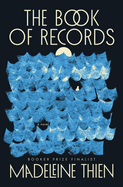
Fans of Madeleine Thien's Do Not Say We Have Nothing, shortlisted for the 2016 Booker Prize, will find familiar themes in The Book of Records. Thien blurs the lines between history and story to build a Möbius strip of a novel that defies pat summaries. In its opening lines, The Book of Records introduces Lina and points to a specific time and place: "Half a century ago, during the rainy season, when I was seven years old, my father and I reached the Sea." It soon becomes clear, however, that this place--and the time Lina and her father spend there--cannot be easily defined. When Lina's father insists that "the buildings of the Sea are made of time," Lina tries to understand: "I was seven years old. I knew that he was pulling my leg and also that he was being truthful."
When Lina meets the neighbors--Jupiter, Bento, and Blucher--they insist that three biographies that she has salvaged do not reflect the lives of their subjects: Chinese poet Du Fu; Dutch philosopher Baruch Spinoza; and German writer Hannah Arendt. Readers will understand that each neighbor represents one of these people, simultaneously themselves in the present and the figure from the past. Thus the novel moves effortlessly across time, raising questions about the nature of a good life and how to respond to catastrophic times. Despite the often heavy nature of their stories, each narrative strand contributes to a sense of lightness, a buoyancy in the face of rising waters that will feel necessary and timely to readers in today's uncertain climate. --Sara Beth West, freelance reviewer and librarian

